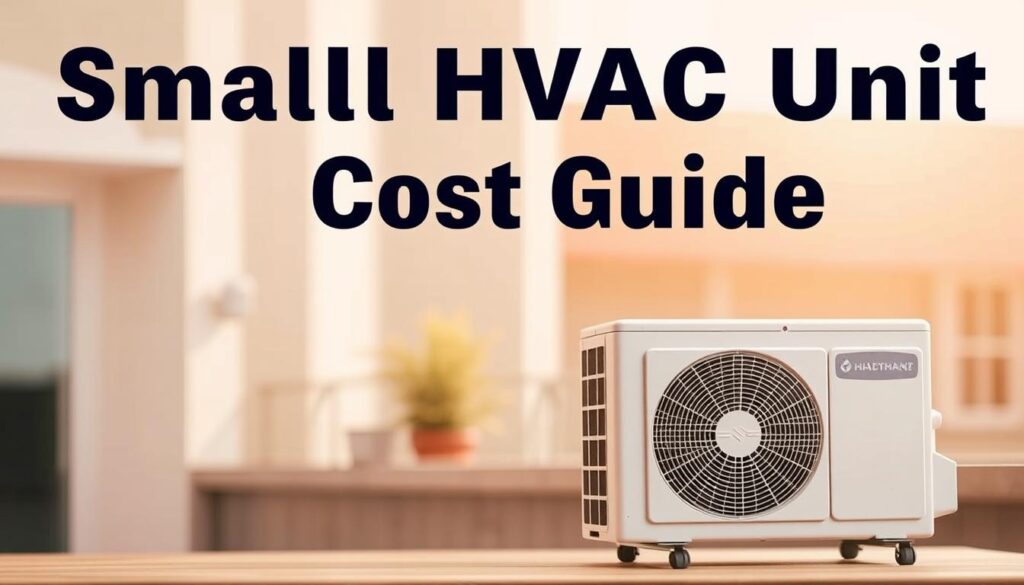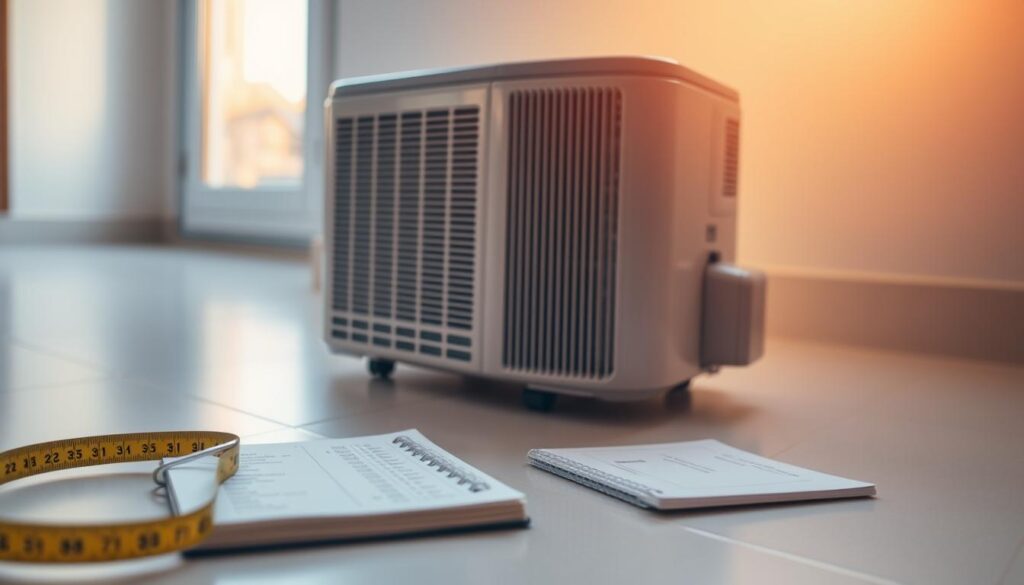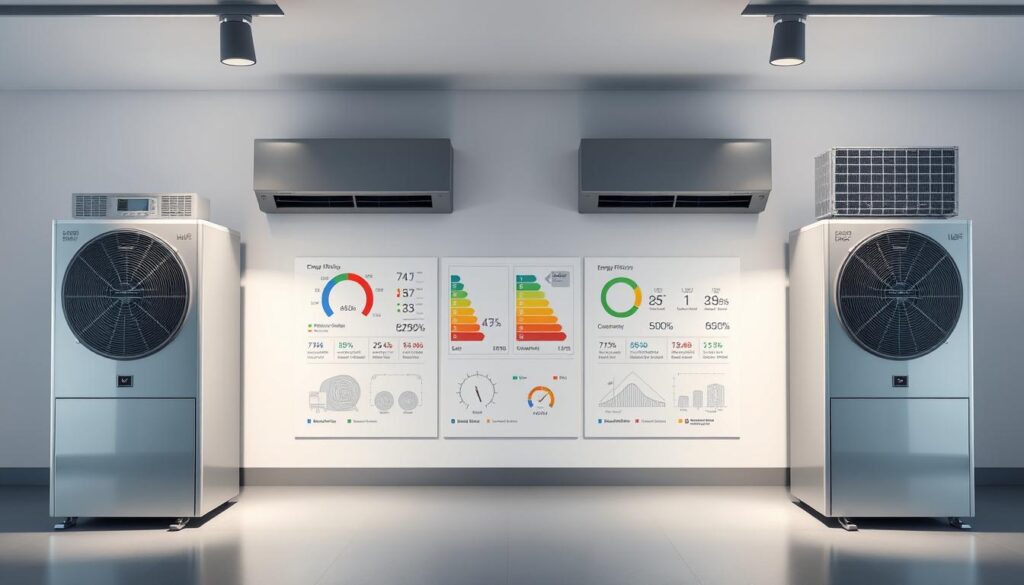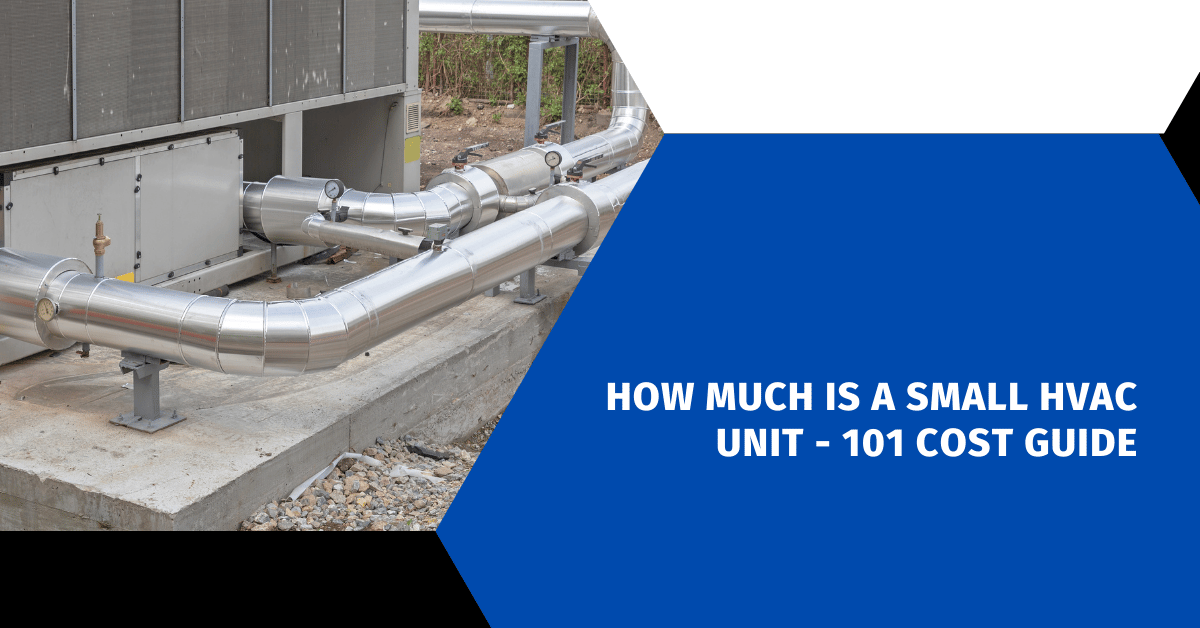Affiliate Disclosure
HVAC Guide Guys is a participant in the Amazon Services LLC Associates Program, an affiliate advertising program designed to provide a means for sites to earn advertising fees by advertising and linking to Amazon.
How Much Is a Small HVAC Unit? Are you curious about the cost of a small HVAC unit? The world of heating and cooling can seem complex, making budgeting a challenge.

It’s important to know the cost of an HVAC unit, whether you’re a homeowner or a small business owner. Installing a central air conditioner can cost between $3,300 and $7,800. Most people pay around $5,750 for a 3-ton unit in a 2,000-square-foot home.
Understanding the cost of a small HVAC unit helps you make smart choices. This guide will cover pricing, system types, and key considerations. It aims to help you find the best value for your money.
Key Takeaways
- Average HVAC unit costs range from $3,300 to $7,800
- Size and efficiency significantly impact pricing
- Different system types have varied price points
- Installation expenses play a critical role in total cost
- Energy efficiency can lead to long-term savings
Table of Contents
Understanding HVAC Unit Basics
Exploring residential hvac systems can seem daunting. But knowing the basics helps you make smart choices for cooling your home. Small space cooling solutions have changed how we keep our homes cool. They offer flexible and efficient ways to control indoor temperatures.
Today’s home cooling systems vary, each tailored for different needs. Picking the right system depends on your space and comfort needs.
Types of Small HVAC Systems
- Window Units: Compact and cost-effective for single rooms
- Portable Air Conditioners: Flexible cooling for mobile spaces
- Ductless Mini-Split Systems: Efficient zone-based temperature control
Common Applications for Small Units
Small space cooling solutions work well in certain situations:
- Apartments with limited installation options
- Home offices or workshops
- Supplemental cooling for hard-to-reach areas
- Rooms with unique architectural constraints
Benefits of Compact HVAC Solutions
| Benefit | Description |
|---|---|
| Energy Efficiency | Lower power consumption compared to central systems |
| Installation Flexibility | Easy to install with minimal structural modifications |
| Cost-Effectiveness | Lower upfront and operational expenses |
Understanding these systems helps you pick the best cooling solution for your home. This ensures your space stays comfortable and efficient.
How Much Is a Small HVAC Unit
Understanding the cost of a small HVAC unit is key to making a smart choice. Prices vary based on several important factors. These factors affect your total investment.
The cost of a small HVAC unit can range from $300 to $3,500. This depends on the type and what it can do. Your needs will help you find the best cooling solution for your space.
- Window units: $150 – $500
- Portable air conditioners: $250 – $700
- Ductless mini-split systems: $1,500 – $3,500
When figuring out the cost of a small HVAC unit, consider these main factors:
| Unit Type | Average Cost | Best For |
|---|---|---|
| Window AC | $250 | Small rooms, apartments |
| Portable AC | $400 | Flexible cooling needs |
| Mini-Split | $2,500 | Homes without ductwork |
“Choosing the right HVAC unit is about balancing cost, efficiency, and your specific cooling requirements.”
Your budget and space needs will guide your choice. Small HVAC units fit various cooling needs. They ensure you find a solution that meets your comfort and budget.
Explore Our HVAC Shop
Looking for top-rated HVAC tools, parts, and accessories? Visit our shop and find the perfect solution for your needs.
Visit the ShopFactors Affecting Small HVAC Unit Prices
Choosing the right HVAC unit involves understanding several key factors that impact pricing. When shopping for energy-efficient HVAC units, you’ll want to consider multiple elements that influence the overall cost and performance of your system.
Understanding these pricing components helps you make an informed decision about affordable HVAC options for your home or office space.
System Size and BTU Rating
The size of your HVAC unit directly affects its price. Cooling capacity is measured in British Thermal Units (BTU), which determines how effectively the system can cool your space. Smaller spaces require fewer BTUs, which typically means lower costs.
- 0-150 sq ft: 5,000 BTU unit
- 150-250 sq ft: 6,000 BTU unit
- 250-300 sq ft: 7,000 BTU unit
- 300-350 sq ft: 8,000 BTU unit
Energy Efficiency Ratings
The Seasonal Energy Efficiency Ratio (SEER) plays a key role in determining both upfront and long-term costs. Higher SEER ratings indicate more energy-efficient HVAC units, which can save you money on electricity bills.
| SEER Rating | Energy Efficiency | Estimated Annual Savings |
|---|---|---|
| 14-15 | Standard Efficiency | $0-$50 |
| 16-18 | High Efficiency | $50-$100 |
| 19-22 | Premium Efficiency | $100-$200 |
Installation Requirements
Your property’s specific characteristics can significantly impact installation costs for affordable HVAC options. Factors like existing ductwork, electrical system compatibility, and home layout will influence the overall expense.
Pro tip: Always get multiple quotes and assess your specific needs before making a final decision.
Small Central Air Conditioning Costs

When planning to cool your home, knowing the cost of hvac units is key. Central air conditioning systems cool your whole house. Prices change based on a few important factors.
The size of a central air system is measured in BTUs. Small homes need units with 18,000 to 36,000 BTUs. This fits homes of 1,000 to 1,500 square feet well.
- Average cost range: $3,000 – $7,500
- Equipment costs: $2,000 – $5,000
- Installation fees: $1,000 – $2,500
When looking at hvac costs, remember these key points:
- System efficiency (SEER rating)
- Home square footage
- Local climate conditions
- Complexity of installation
Your home’s needs will affect the cost. Smaller homes with simple layouts cost less to install. Larger, more complex homes cost more.
Pro tip: Always get multiple quotes from certified HVAC professionals to ensure competitive pricing and proper system sizing.
Explore Our HVAC Shop
Looking for top-rated HVAC tools, parts, and accessories? Visit our shop and find the perfect solution for your needs.
Visit the ShopMini-Split System Pricing Guide
The cost of ductless air conditioners varies a lot. This is because of several important factors. Knowing about these systems helps you choose the best cooling option for your home.
Mini-split systems are great for homes without ductwork. They cool your space well and don’t mess up your home too much.
Single Zone vs Multi-Zone Costs
The price of mini-split systems depends on how many zones you need:
- Single-zone systems: Perfect for small rooms or areas
- Multi-zone systems: Great for cooling many areas at once
| System Type | Average Cost Range | Best For |
|---|---|---|
| Single-Zone Mini-Split | $2,000 – $5,000 | Individual rooms |
| Multi-Zone Mini-Split | $5,000 – $10,000 | Entire home cooling |
Installation Considerations
When you get a mini split system, the price includes a few key things:
- The size and power of the equipment
- How energy-efficient it is
- How hard it is to install
- The cost of local labor
Brand Comparison
When looking at ductless air conditioner prices, check out brands like Mitsubishi, Daikin, and LG. Each brand has special features that affect price and how well it works.
Getting a pro to install it makes sure it works right and saves you money in the long run. Always ask for quotes from different places to find the best price for mini split systems in your area.
Window and Portable AC Unit Costs
Are you looking for ways to cool your home without spending a lot? Window AC units and portable air conditioners are great options. They are affordable and can cool your space effectively.
Window AC unit prices vary from $150 to $800. Several factors influence these prices:
- Room size and BTU requirements
- Energy efficiency ratings
- Brand reputation
- Additional features
When looking at window AC unit prices, think about the total cost. Portable AC units are also affordable, costing between $200 and $900. They are perfect for areas where installing a window unit isn’t possible.
| AC Unit Type | Price Range | Installation |
|---|---|---|
| Window AC Unit | $150 – $800 | DIY or Professional |
| Portable AC Unit | $200 – $900 | No Installation Required |
Choosing between window and portable units depends on your needs and budget. Energy-efficient models might cost more upfront but can save you money on electricity bills in the long run.
Installation Cost Breakdown
Installing a new HVAC unit has many parts that affect the cost. Knowing these costs helps you plan your budget better. It also helps you find cheaper options for your home or business.
When you plan to install an HVAC unit, you’ll face different costs. These costs can change a lot based on several things.
Labor Expenses
Professional installation is a big part of the cost. Labor rates depend on a few things:
- Contractor expertise and certification
- Complexity of the installation
- Regional labor market rates
- Time needed for the installation
Additional Materials
You’ll also need extra materials for the installation:
| Material | Estimated Cost |
|---|---|
| Refrigerant Lines | $150 – $500 |
| Mounting Brackets | $50 – $200 |
| Electrical Components | $100 – $300 |
| Insulation | $75 – $250 |
Permit Requirements
Local rules often require specific permits for HVAC installations. Permit costs can vary a lot between places, usually from $50 to $500. Always check with your local building department for exact costs and rules.
By planning well and knowing these costs, you can manage your HVAC project budget. This ensures a professional and code-compliant installation.
Explore Our HVAC Shop
Looking for top-rated HVAC tools, parts, and accessories? Visit our shop and find the perfect solution for your needs.
Visit the ShopEnergy Efficiency and Operating Costs

Knowing how energy-efficient your home cooling system is can save you money and make your home more comfortable. Today’s energy-efficient HVAC units offer big savings and better performance than just cooling.
The Seasonal Energy Efficiency Ratio (SEER) is key to judging home cooling systems. A SEER of 14 or 15 is the U.S. Department of Energy’s minimum standard. Higher SEER ratings mean less energy use and lower bills.
- Units with SEER ratings of 16-20 can cut energy costs by up to 30%
- Energy-efficient HVAC units might get you federal tax credits
- Smart thermostats can make cooling even more efficient
When picking energy-efficient HVAC units, think about these important points:
- The size of your living space
- Your local climate
- The quality of your insulation
- How your ductwork is set up
Even though high-efficiency home cooling systems might cost more at first, they save money in the long run. Keeping your system well-maintained and getting regular checks from pros can keep it running at its best for years.
Pro tip: Choose ENERGY STAR certified models for the best efficiency and rebates.
Maintenance and Repair Expenses
Keeping your home cooling systems in top shape needs regular care and sometimes repairs. Knowing the costs helps you budget and care for your HVAC systems.
Regular maintenance stops expensive breakdowns. Homeowners should plan for several key tasks each year:
- Quarterly filter replacements
- Annual professional system inspections
- Cleaning air vents and ductwork
- Checking refrigerant levels
The cost of maintaining home cooling systems varies. Several factors play a role:
| Maintenance Type | Estimated Cost | Frequency |
|---|---|---|
| Basic Tune-up | $75 – $200 | Annually |
| Filter Replacement | $10 – $50 | Every 3-4 months |
| Comprehensive Inspection | $150 – $300 | Annually |
Unexpected repairs can cost a lot. Common repair costs range from $150 to $1,500. This depends on the issue and your HVAC’s age. Regular maintenance lowers the chance of big repairs.
To cut down on maintenance costs, try these tips:
- Schedule regular professional inspections
- Replace filters consistently
- Keep outdoor units clean and unobstructed
- Address small issues before they become major problems
Regular care for your home cooling systems saves money and extends your HVAC’s life.
Explore Our HVAC Shop
Looking for top-rated HVAC tools, parts, and accessories? Visit our shop and find the perfect solution for your needs.
Visit the ShopComparing Different Brands and Models
When picking residential hvac systems, knowing the top manufacturers is key. The market has many energy-efficient hvac units. They vary in features, prices, and how well they work.
Choosing the right HVAC brand is more than just the cost. Look at brands like Carrier, Lennox, and Trane. They are known for quality and new tech.
Top Manufacturers in the Industry
- Carrier: Known for reliability and cutting-edge technology
- Lennox: Specializes in high-efficiency systems
- Trane: Renowned for durability and performance
- Rheem: Offers budget-friendly yet quality options
Price Ranges by Brand
Prices for residential hvac systems vary by brand and features:
- Budget Brands: $2,000 – $4,000
- Mid-Range Brands: $4,000 – $7,000
- Premium Brands: $7,000 – $12,000
Warranty Options
Warranty coverage is important for your hvac investment. Top brands usually offer:
- Standard warranty: 5-10 years
- Extended warranty options
- Registered product warranties
- Coverage for parts and compressors
Make sure to check the warranty details. It helps protect your hvac system.
Conclusion
Choosing the right small HVAC unit is important. You need to think about your cooling needs. Prices vary from affordable window models to advanced mini-split systems.
Prices usually range from $5,000 to $12,500. This depends on the system’s complexity and efficiency. It’s all about finding the best cooling solution for small spaces.
Energy efficiency is key when picking a unit. Modern systems save money by using less electricity. Look for high SEER ratings and proper installation for long-term savings.
Getting advice from experts is essential. Look at different brands and compare prices. Consider warranties, maintenance, and energy rebates to get the most value.
Your space, climate, and budget will help you decide. Take your time to figure out what you need. Ask certified HVAC pros for detailed quotes. Choose a unit that cools efficiently without breaking the bank.

